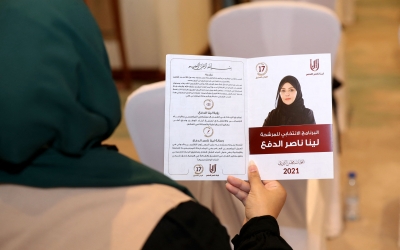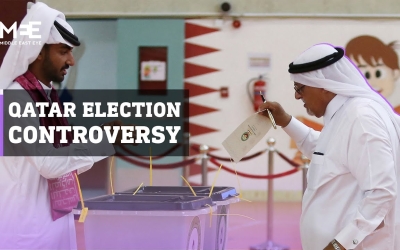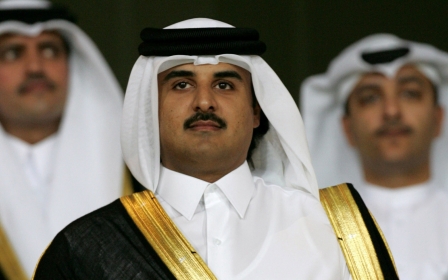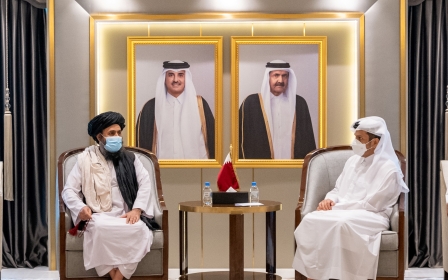Qatar holds first-ever legislative elections
Qataris began voting in the emirate's first legislative election on Saturday in a symbolic nod to democracy that analysts say will not lead to power shifting away from the ruling family.
Voters trickled into polling stations, where men and women entered separate sections to elect 30 members of the 45-seat Shura Council.
The Council will have legislative authority and approve general state policies and the budget, but has no control over executive bodies setting defence, security, economic, and investment policy for the small but wealthy gas producer, which has banned political parties.
Some 101 candidates, more than one-third of the entire field, had dropped out of the race by Saturday afternoon according to state-run Qatar TV, apparently to support other candidates in their constituencies.
After the withdrawals, there were 183 candidates in contention for the 30 seats up for grab.
The ruling emir will continue to appoint the remaining 15 members of the Council.
Polls opened at 0500 GMT and will close at 1500 GMT with the results expected the same day. The election saw a 44 percent turnout rate, the Supervisory Committee, an oversight body, reported later in the day.
A voting ‘experiment’
Across the Arabian desert peninsula nation, orderly queues of Qataris in national dress formed inside polling stations, mostly schools and sports halls.
They cast their ballots into semi-transparent plastic boxes emblazoned with the dhow boat, crossed swords, and palm tree emblem of Qatar.
For 25-year-old Sheikha Ateeq al-Khulaifi, from Doha, the election is a historic moment.
'When I was putting my tick, folding it and putting it in the box, I felt like I was part of something bigger'
- Sheikha Ateeq al-Khulaifi, 25, voter
"It's a landmark, voting for the first time here -- it's incredible that I get to be part of it. When I was putting my tick, folding it, and putting it in the box, I felt like I was part of something bigger,” Khulaifi told AFP.
"I'm really excited to see where this goes.”
The streets of Qatar's towns have recently been dotted with billboards adorned with beaming candidates sporting national dress.
Beyond single-candidate town hall meetings, posters, and TV spots, the country's electoral exercise has been limited, with no change of government possible and political parties outlawed.
Candidates have uniformly avoided debate about Qatar's foreign policy or status as a monarchy, instead focussing on social issues including healthcare, education, and citizenship rights.
"This is a first-time experience for me... to be here and meet people talking about these things that we need," Khalid Almutawah, a candidate in the Markhiya district, told Reuters.
"At the end of this day, the people of Qatar, they're going to be part of the decision-making," said another male candidate in the same district, 65-year-old Sabaan Al-Jassim.
Fear of exclusion
The latest government lists showed 26 women among 234 candidates across 30 districts in the country, which has for several years held municipal polls.
Voters such as Munira, who writes children's books and asked to be identified by only one name, told Reuters that she was “really happy about the number of women standing as candidates".
"With the chance to vote, I feel this is a new chapter," she added.
All candidates had to be approved by the powerful interior ministry against a host of criteria, including ancestry, age, and character.
Candidates were also required to register official campaign events with the ministry in advance, as well as the names of all speakers as authorities seek to clamp down on possible sectarianism or tribalism.
Candidates have to stand in electoral divisions linked to where their family or tribe was based in the 1930s, using data compiled by the then-British authorities.
In Al-Khor, a fishing town north of Doha, voters flocked to the polls in one district that has 13 candidates - making it one of the most competitive races in the country.
"There are a large number of candidates... but for me the most important thing in the selection is competence," said voter Rashid Abdul Latif Al-Mohannadi, 37.
Diplomatic sources suggest families and tribes have already conducted internal ballots to determine who will be elected for their constituencies.
"When you don't have political parties... people sometimes will tend to vote for people they know, or for members of family or members of tribe," said Courtney Freer, a fellow at Emory College in Atlanta, Georgia, USA.
Qataris number about 333,000, but only descendants of those who were citizens in 1930 are eligible to vote and stand, disqualifying members of families naturalised since then.
Some members of the sizeable al-Murrah tribe are among those excluded from the electoral process, which has sparked a fierce debate online and isolated protests.
Observers say the decision to hold the election, required under the 2004 constitution but repeatedly delayed in the "national interest", comes amid heightened scrutiny as Qatar prepares to host the 2022 World Cup.
"It's a way to show that they are moving in the right direction, that they want to achieve more political participation" before the World Cup, said Luciano Zaccara, an assistant professor in Gulf politics at Qatar University.
Most of Qatar's 2.5 million residents are foreigners, ineligible to vote.
Middle East Eye propose une couverture et une analyse indépendantes et incomparables du Moyen-Orient, de l’Afrique du Nord et d’autres régions du monde. Pour en savoir plus sur la reprise de ce contenu et les frais qui s’appliquent, veuillez remplir ce formulaire [en anglais]. Pour en savoir plus sur MEE, cliquez ici [en anglais].






